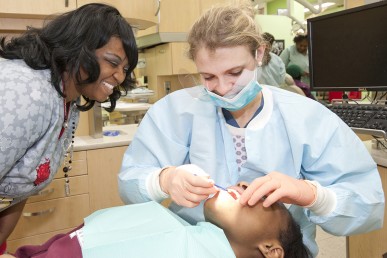Free periodontal screenings assess risk for disease

Dental assistant Desiree Pinkney (left) and Agata Lefere, a pediatric dental resident, examine St. Malachy eighth-grader Serina Hughes at the College of Dentistry’s Give Kids a Smile Day Feb. 5. The college will offer free periodontal evaluations through Friday. Photo: Roberta Dupuis-Devlin
Half of American adults aged 30 and over — nearly 65 million — have periodontal disease, according to the Centers for Disease Control and Prevention.
But the condition doesn’t just affect the mouth.
If left untreated, periodontal disease can lead to tooth loss, but research has shown that it is also associated with other chronic inflammatory diseases, such as cardiovascular disease and diabetes, said Phillip Marucha, professor and head of the department of periodontics in the College of Dentistry.
For National Periodontal Health Month, the college’s postgraduate clinic is offering free periodontal evaluations through Friday.
The assessments will gauge an individual’s periodontal health, diagnose existing disease, assess risk for disease and determine any needed treatment.
The screenings will be conducted daily from 9 a.m. to 12:30 p.m. and 1:30 p.m. to 4:30 p.m. No appointment is necessary.
The College of Dentistry is located at 801 S. Paulina St., Chicago.
Periodontal disease is a chronic inflammatory disease that affects the gum tissue and bone supporting the teeth.
Symptoms of gum disease include bad breath that won’t go away, red or swollen gums, tender or bleeding gums, painful chewing, loose or sensitive teeth, and receding gums or longer appearing teeth.
Several risk factors are associated with periodontal disease, including smoking, hormonal changes in females, other diseases such as cancer or AIDS, medications and genetics, said the U.S. Department of Health and Human Services.
People usually don’t show signs of gum disease until they are in their 30s or 40s, and it is more prevalent in men.
The key to avoiding gum disease is to keep the teeth and gums healthy, said Saba Khan, clinical assistant professor and director of UIC’s postgraduate peridontics program.
Individuals can do so by brushing their teeth twice daily with fluoride toothpaste and flossing regularly to remove plaque from between teeth.
Every patient should receive a periodontal evaluation annually, she said.
